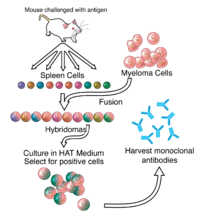
Photo from wikipedia
Background: NRG1 fusions are oncogenic drivers of various cancers including pancreatic and lung adenocarcinomas. NRG1 fusion proteins bind to HER3, leading to HER2/HER3 heterodimerization, increased downstream signaling, and tumor growth.… Click to show full abstract
Background: NRG1 fusions are oncogenic drivers of various cancers including pancreatic and lung adenocarcinomas. NRG1 fusion proteins bind to HER3, leading to HER2/HER3 heterodimerization, increased downstream signaling, and tumor growth. MCLA-128 is a bispecific antibody directed against HER2 and HER3 that docks on HER2 and blocks ligand binding to HER3, thereby preventing downstream signaling. In contrast to tyrosine kinase inhibitors or anti-HER3 monoclonal antibodies, MCLA-128 was shown in vitro and in vivo to potently inhibit ligand-driven tumor growth at high NRG1 levels present in NRG1 fusion-positive cancers. MCLA-128 offers a novel therapeutic paradigm for NRG1 fusion-positive cancers. MCLA-128 has a very well tolerated safety profile with Citation Format: Alison M Schram, Eileen M O’Reilly, Romel Somwar, Ryma Benayed, Sara Shameem, Thrusha Chauhan, Jean Torrisi, Jim Ford, David Maussang, Ernesto Wasserman, Marc Ladanyi, David M Hyman, L. Andres Sirulnik, Alexander Drilon. Clinical proof of concept for MCLA-128, a bispecific HER2/3 antibody therapy, in NRG1 fusion-positive cancers [abstract]. In: Proceedings of the AACR-NCI-EORTC International Conference on Molecular Targets and Cancer Therapeutics; 2019 Oct 26-30; Boston, MA. Philadelphia (PA): AACR; Mol Cancer Ther 2019;18(12 Suppl):Abstract nr PR02. doi:10.1158/1535-7163.TARG-19-PR02
Journal Title: Molecular Cancer Therapeutics
Year Published: 2019
Link to full text (if available)
Share on Social Media: Sign Up to like & get
recommendations!